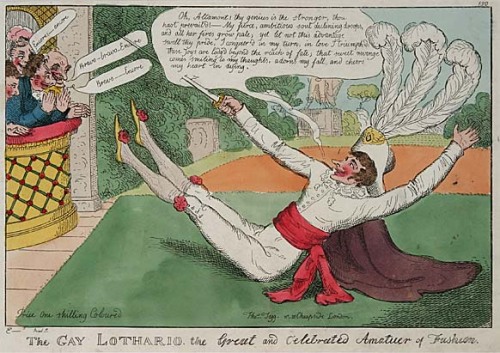#robert coates
Why February 21st is BRILLIANT
The Celebrated Philanthropic Amateur
Today we want to tell you about Robert Coates. We don’t know when his birthday was, but we do know that he died on this day in 1848, after being run over by a Hansom cab outside the Theatre Royal, Drury Lane at the age of seventy-five. Robert was the son and heir of a sugar planter and was born in Antigua some time in 1772. Robert was a most flamboyant amateur actor. He was also a terrible actor, and it made him famous.
Robert was educated in England and became enamoured of amateur dramatics after he returned to Antigua in the West Indies. In 1807, after his father died, he inherited the estate and a huge collection of diamonds, which he also loved. He returned to England and settled in Bath, where he lived as a ‘gentleman of fashion’. By 1809, he was acting at the Royal Theatre, Bath, though it seems no one paid him to do so. He particularly loved Shakespeare and made his debut as Romeo. He designed the costume himself. It consisted of a flowing sky blue cloak with sequins, red pantaloons, a muslin shirt worn with a huge cravat, a long wig that Charles II would have been proud of and white hat with ostrich plumes. He also wore diamonds. Lots and lots of diamonds. What’s more, he had had his costume made rather too small, which made him move awkwardly and also the pantaloons split part way through the performance. But it wasn’t just his costume that was comical. He also forgot his lines, ad-libbed, stopped in the middle of the balcony scene to take snuff, and then offer it to the audience and at the end, he tried to open Juliet’s tomb with a crowbar.
This title role was his favourite, it was one he would revisit often. It led to him being given the nickname 'Romeo Coates’ His performances were always sell-outs. People went to see him just to see if he was bad as everyone said. He was not above repeating his favourite scenes during a play. As Romeo, he might die three or four times. On one occasion he caused a lot of hilarity when he took out a handkerchief to dust down the stage and arrange his hat as a pillow before he lay down to die. The laughter, the abuse, the cat calls that accompanied his performances often drowned out his actual words. It’s hard to say whether he actually knew he was bad and just didn’t care or whether he was doing it all on purpose.
He certainly bore the abuse he received in good humour. Even when he received an invitation to a ball given by the Prince Regent. He dressed in his finest clothes and presented himself at Carlton House, only to find that the invitation had been a forgery and he had to go away again. The Prince felt terrible about it when he heard and really felt that Robert ought to have been let in anyway because everyone would have enjoyed his company. In fact, he felt so bad that he invited Robert to come along afterwards and have a look at the decorations which were still up. Robert was delighted and said that he would love to see the preparations that had been made for the honoured guests, of whom he had almost been one. The forger turned out to be Theodore Hook, who we mentioned several weeks ago as the perpetrator of the Berner’s Street Hoax. The joke fell rather flat in this case and probably even Theodore thought he’d been quite mean, because he was always quite apologetic when ever it was mentioned.
After moving to London, he soon became a well recognised figure. Particularly as he used to go about in furs, whatever the weather. But it was really the carriage he had made for himself that truly made him stand out. No one else had anything quite like it. It is described as shaped like a scallop shell and 'a beautiful, rich lake colour’ which we can only assume means crimson lake, a dark pinkish red. It had his own heraldic device on the side, a crowing cockerel, with the motto 'While I live, I’ll crow’. It also had at least one silver plated crowing cockerel on it. It was drawn by two white horses.
Of course, he acted in London. He appeared frequently at the Haymarket Theatre. He usually appeared as part of a benefit performance. For this he earned, or perhaps gave himself, his preferred nickname 'The Celebrated Philanthropic Amateur’. The manager knew he would be guaranteed a full house when Romeo Coates was on the bill. In fact, they would often have to turn people away. At one of his performances, several audience members had to be treated for 'excessive laughter’. People who had to act with him had a difficult time, because they had to work round what ever he happened to do. Once, when his Romeo was about to die a third time, Juliet had to put an end to it by stepping up and saying. “dying is such sweet sorrow, that he will die again until tomorrow.” His tour of the provinces proved equally popular, as were the impersonations given of him by comedians. Sadly, his popularity declined and he was forced to retire from acting, in public at least, around 1816.
He married, moved to France for a time and then back to London. On February 15, 1848 he was leaving the Theatre Royal, Drury Lane when he realised he had forgotten his opera glasses, which he had borrowed from a friend. He stepped down from his carriage to fetch them and was hit by a speeding Hansom cab. Rather than stop, the driver ran right over him and sped away. He was never caught. Robert died six days later from his injuries.
Post link



